
CLAMP has always told great stories. Cardcaptor Sakura has captured the imagination of a generation of young girls and remains one of my all-time favorite animes to date. It weaves magic, heroism, and romance in a way that keeps you coming back to see what new card or what new mystery Sakura will have to solve this time. Chobits offered an interesting look into the problems of human and android relationships. It commented on the meaning of love and of existence in general. Tsubasa took some of CLAMPS most famous characters and turned them upside down to discuss the nature of relationships, of memories, and the interconnectedness of the universe. And now, one of my other favorite CLAMP series seems to go a step further, offering a peek into the human psyche and the universe itself, XXXHolic.
There are a few universal truths to this series that each story arc builds off of, and then some smaller commentary on different phenomena and human nature within those general rules. I’d like to take a look at a few of those today and begin to build a picture of what exactly the philosophy and psychology of this series is. To start, there are two main rules the universe and characters of XXXHolic follow: equivalent exchange and hitsuzen (or fate).
You may recognize the law of equivalent exchange from Fullmetal Alchemist, and it does have pretty much the same meaning. To receive something, you must give something of equal value. That is the rule that Yuko follows for every kind of aid she gives the people that come to her shop and in every personal interaction she has. Too little or too much can throw off the balance of life, with the consequences of which manifesting in the real world. This rule forms the basis for many of the issues that come up in story arcs. We get to see what happens when equivalent exchange is ignored and the balance is thrown off.

The meaning of hitsuzen is a little hard to explain, but we can equate it to events that happen in accordance to some preordained plan or scheme. In Yuko’s world and in the world of XXXHolic, everything is hitsuzen, everything happens for a reason. Meeting someone on the street? Hitsuzen. Finding an object you never knew you needed? Hitsuzen. Finding your way to Yuko’s shop of wish granting? Hitsuzen. These preordained meetings create connections with people that will be meaningful in the future, and also provide a jumping off point for many arcs as people find their way to Yuko’s shop with or without a wish in mind.
So let’s take a look at a few of the smaller story arcs to get a deeper look into what kinds of messages CLAMP is trying to impart and how those fit into the two overall thematic elements I mentioned above.
The Weight of Lies: Chapters 1 and 2

The first arc we are exposed to in the series is the story of a young woman you finds herself on the store’s doorstep, not quite sure why she was drawn there. A thin black wisp of some sort of smoke curling around her body, originating from her pinky. She tells Yuko she can no longer mover her pinky finger, and she’s not sure why. When asked about any bad habits she may have that could have caused this, she denies that she has any, and the smoke gets thicker and begins to give off a noxious smell. In the end, Yuko gives her a small ring to put on her pinky and tells her to think about any bad habits she may have.
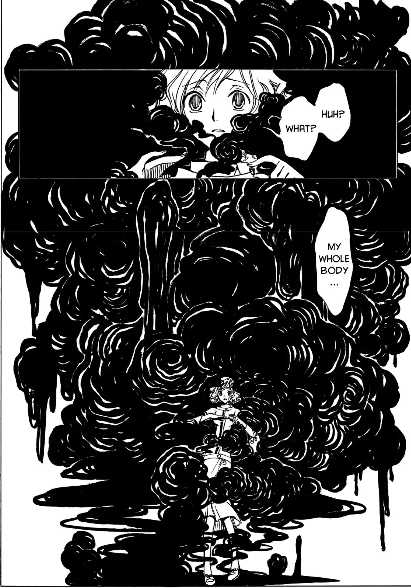
Her bad habit, we realize later, is lying. She’s a pathological liar for whom the smallest lies. Like those about her age or profession, seem to come naturally. However, the problem with lies is that they can come back to haunt you later. We see some this manifest in both the black smoke that begins to envelop her, sapping the strength of her body, and the opinions of the people who know her, who begin to figure out her lies. The woman sees the things she lies about as inconsequential and unimportant, and so sees no problem lying about them. But there are importance in even the smallest words we use.

This story arc becomes a cautionary tale about the weight attributed to the words that we say and how they can come back to haunt us later. It shows us how every action we take has weight and consequence. In the end, the woman becomes swallowed by her lies, never realizing the bad habit that drove her to her untimely end.
How to Conquer Addiction: Chapters 5 and 6

The previous story wasn’t the only arc that deals with bad habits and how to break them. Chapters 5 and 6 introduce us to a friend of Yuko who is trying to find help to break her addiction to the internet. The woman tells her that her husband confronted her about the amount of time she spends on her computer, telling her that she is neglecting her family, that their children are lonely without her. The woman has decided to quit her computer completely because of this, but she doesn’t think she can do it on her own, so she has sought out Yuko.
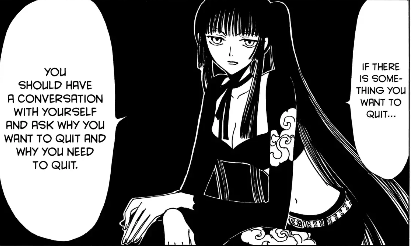
Addiction is something I think a lot of us have dealt with. Caffeine, video games, and social media addiction are just a few of the more modern kinds that we see sometimes now in addition to other more hardcore chemical addictions. It becomes a story about how to overcome addiction and what a person can do to succeed or to fail. Take the woman’s reason for wanting to quit, something Yuko points out as a reason she may fail: she is not doing this for herself. She wants to quit because her husband wants her to quit. A person can only find success beating a bad habit like this if they do it for themselves. Making a promise to yourself is more meaningful than making a promise to someone else.
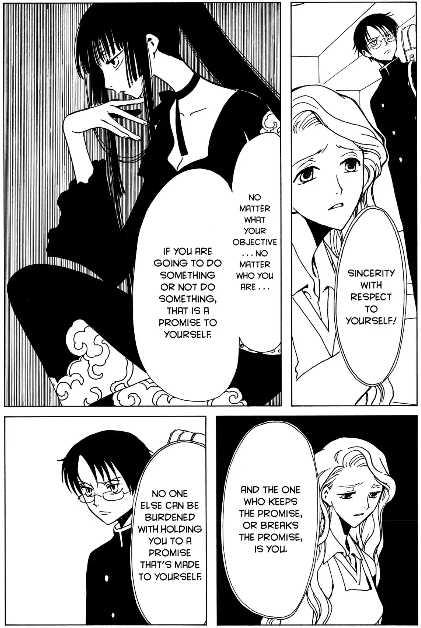
In the words of Yuko: “Quitting something and doing something both have the same meaning. They are accomplishments. The two necessary items are sincerity and action.” (144-145) We see these lessons manifest after Yuko leaves. The woman begins finding small reasons to begin using her computer again. Saying, oh I just need to send final goodbye emails, or I just need to let people know I won’t be returning. But in the end, she is sucked back in. In the end, she lacked sincerity and action. It is only through Yuko destroying her computer and we hear her admission that she wants to keep her current life that we feel the hope that she will succeed. (140) It’s another cautionary tale about the weight of our actions and sincerity we put behind them. A lesson in psychology that we can take with us into our own lives.
The Monkey’s Paw and Overconfidence: Chapters 17-20

This next story arc is a great example of equivalent exchange and hitsuzen, but it also features a great commentary on the nature of confidence and how we think of ourselves. These couple chapters introduce us to a young student teacher who finds herself drawn to Yuko’s shop as Watanuki is laying out a bunch of items from her treasure trove. She winds up picking up a small decorated cylinder from the pile that no one noticed was there in the first place. She becomes entranced by it and offers to buy it from Yuko. In response, Yuko tells her she can have it but must never open it. We find out shortly after that the cylinder holds a monkey’s paw, a mystical object that grants five wishes but often brings disaster and death to those who use it.
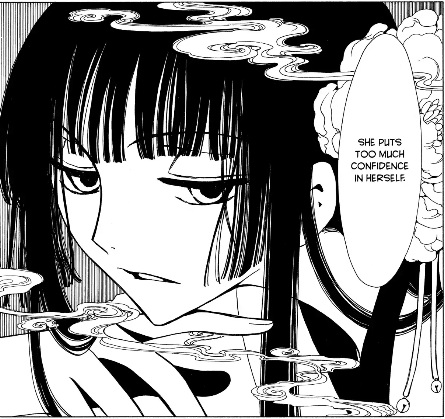
The problem presented in this story isn’t just that the monkey’s paw brings disaster to its user, but that overconfidence in one’s abilities and luck can also lead to unintended consequences. In the words of Yuko, “No one can consider themselves special”. Having too much confidence in oneself can lead to not considering all options or not being cautious enough in the decisions that you make because you think everything will always go well for you. This is what happens with the unassuming woman in this story. She thinks herself above the consequences that other people have faced when using the monkey’s paw that she isn’t as cautious about phrasing her wishes or considering where the things she wished for are coming from.

It presents us with a cautionary tale of equivalent exchange as well as what happens when we consider ourselves above the law of nature. One of the wishes she makes is to have it rain all day, but that water has to come from somewhere, so it comes from the school pool. Her wish for an original idea for her research paper has the monkey’s paw stealing the notes from another researcher leading to claims of plagiary and theft leveled against her later. All of that self confidence begins to wane as she realizes that her belief that her luck is better than everyone else’s is wrong. She isn’t special, she isn’t above consequences, and the monkey’s paw doesn’t care what happens to her.
Self-Fulfilling Prophecies and the Power of Words: Chapters 22 and 23

I think one of the most universal ideas in psychology and in this series is the power of words and the kind of effect they have one someone. In chapters 22 and 23 we get introduced to two twin sisters whose words manifest in the real world to have detrimental effects on each other. It’s this idea of a self-fulfilling prophecy, the words that we tell ourselves influence our future thoughts and actions. XXXHolic takes it one step further and gives real power to those words to manifest as things that happen because they say these words.
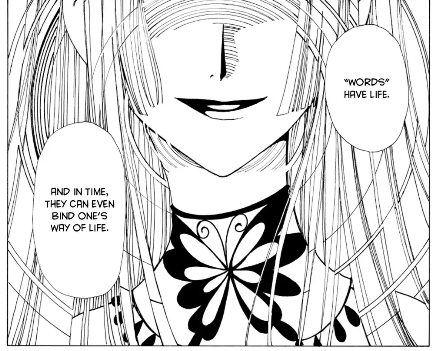
One of the moments that Watanuki meets one of the sisters, she has lost one of her contact lenses and Watanuki stops to help her look. However, even before they start searching, she says “I don’t think we’ll find it”, and we see these waves ripple around her from her words. They never end up finding her contact, and we see later just how much power her words and those of her sister have. When she wants to leave a movie and get away from her sister who’s been hitting on the guy she’s interested in, she says “I want to leave” and suddenly she starts bleeding from her forehead. But it’s not only her words, we see that he sister’s words have a powerful effect on her as well because of the connection that they have.

Words will always have more power coming from ourselves and the people we care about. As one sister is trying to overcome her negative thoughts, the other sister is projecting her worries onto her through words that make her question her abilities and confidence. Her sister’s words cause her to fail at her job, drop cups and plates, and hurt herself in the process. The story of these twins give us a cautionary tale of the power our words can have on how we think about ourselves and the development of self-confidence. Worrying about failing or regretting the results of some future action is one of the basics of anxiety, but I think Watanuki speaks some very poignant words about this: “If you start worrying about failing gain, you’ll never do anything! Regrets are for after something happens!!”
So What is Overall Psychology and Philosophy?
We see so many different bits of philosophy and psychology presented through each serial story throughout the chapters of this manga. We see that words have power, we see that one must never think themselves above the laws of the universe, and we see how our actions have weight and consequence for ourselves and other people. Equivalent exchange and the power how people fit into the grand scheme of things is just one overarching law of the universe presented to us as the basis for so much more. However, besides all of these smaller aspects, there is another overarching theme that XXXHolic discusses: how people are affected by their connections with other people.
Throughout the whole series we watch Watanuki grow into maturity and learn to appreciate the friends that he has. At first he sees himself as worthless, undeserving of the love his friends give him. But through the sacrifices they make for him and the sacrifices he makes for others, he begins to see how his actions affect the people around him and how powerful the connections he has formed with his friends really are. By making sacrifices to negate the sacrifices his friends have made for him, he had essentially made their efforts worthless and had made the worry and care they expressed seem worthless. Over time Watanuki learns one very important lesson that I think we can see stretching over the whole series: “We never belong entirely to ourselves.”
~~Thanks for Reading!~~
Follow me on Facebook, Twitter, and WordPress for all Bloom Reviews content updates and news!



This was a really nice reminder of some of the ideas in xxxholic. Its a story that really does have so much to say and is very enjoyable to delve into. Thanks for sharing.
LikeLiked by 1 person
Thanks for such an in-depth analysis of xxxHolic! I don’t see a lot of articles like this for the series, and it’s such a shame because there’s so much about the story that I wish we could discuss. I’ve always struggled to find a lot of series that I really like in this genre after reading xxxHolic, just because I love the story so much. One series has caught my attention though. It’s called The Shop with No Name, and it builds off of the idea of a shop that sells cursed items to serve out karmic justice. It carries the same kind of creepy/unsettling vibe that xxxHolic has, so if you’re ever looking for more series to try out, I highly recommend looking into it.
LikeLiked by 1 person
Thanks for the recommendation! I’ll have to check it out!
LikeLike
it’s getting a live action and the theme song for it, Habit by SEKAI NO OWARI, is all about breaking apart from labels and stopping bad habits! i just think that’s sorta cool aha
LikeLiked by 1 person